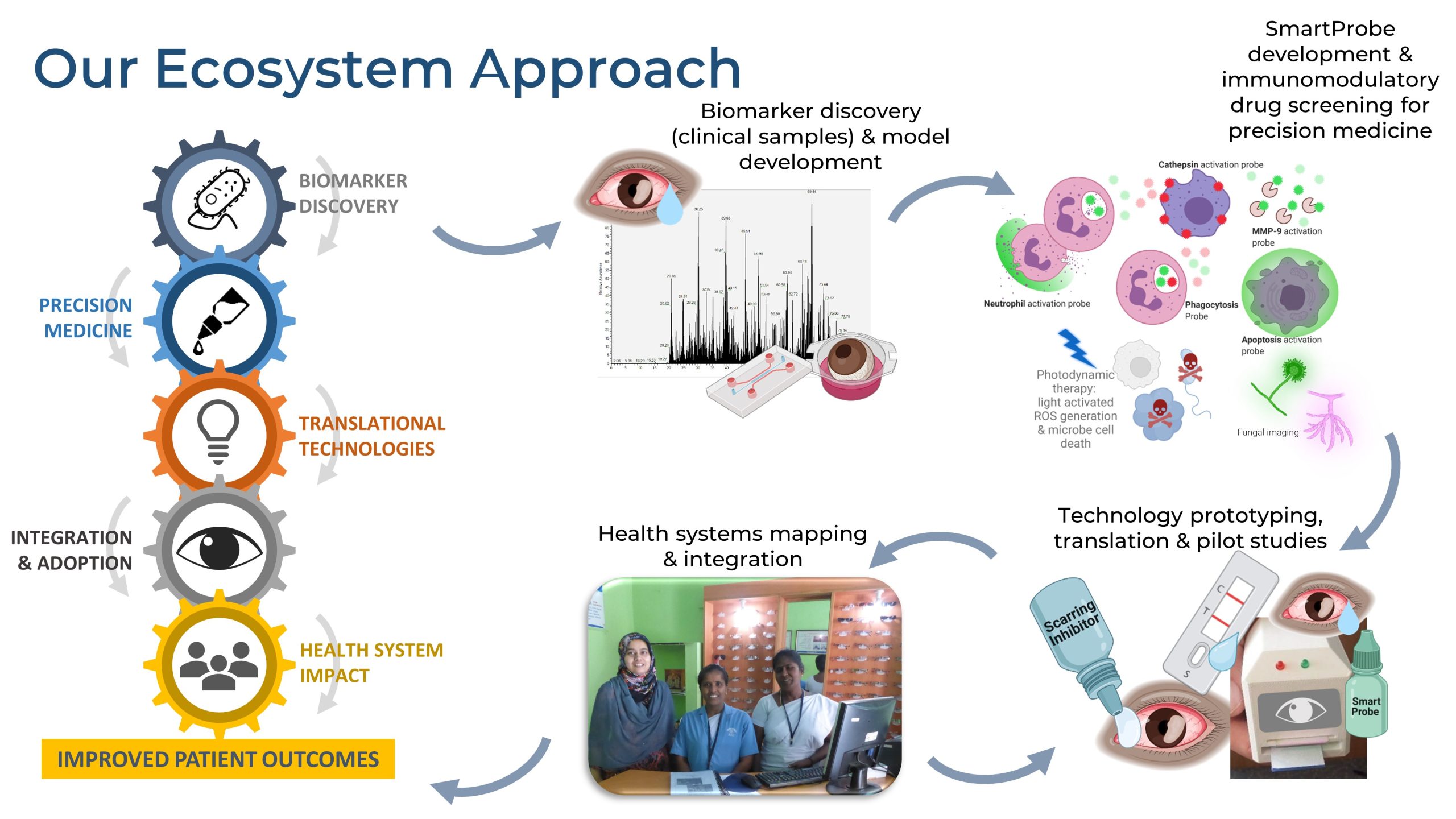Corneal Infections
Microbial Keratitis – an infection of the cornea caused by invading bacteria or fungi – is a silent epidemic, disproportionately affecting low-middle income countries, and is a major cause of blindness.
We are working in close collaboration with Aravind Eye Care System (AECS), and the Aravind Medical Research Foundation (AMRF), India, to reduce needless blindness attributed to microbial keratitis (corneal ulcer).
Background
Microbial Keratitis (MK) – an infection of the cornea caused by invading bacteria or fungi – is a silent epidemic, disproportionately affecting low-middle income countries (LMICs), and is a major cause of blindness. Despite being a WHO priority disease area, it has not explicitly been covered by Vision2020 frameworks and as such, it has garnered little policy, research or development focus over the last 20+ years. In India alone, 1.5-2 million people experience corneal ulcer per year, predominantly affecting the rural-poor.
Corneal ulcer is an “ophthalmic emergency” and the longer the delay to seek appropriate treatment, the worse the outcome. Even where gold-standard diagnostics and treatments are available, over 60% of corneal ulcer patients are still left with visual impairment across India, and >10% of patients require expensive and often unsuccessful surgical interventions such as corneal transplant.
These permanent, debilitating outcomes are often attributed to an excessive and uncontrolled inflammatory response, leading to scarring and corneal perforation. Furthermore, these bleak statistics are for the minority of patients who are able to access specialist care in large cities. The rural-poor are, in reality, much worse off. A radical re-development of the entire healthcare pathway, from diagnosis to treatment, is required to improve the prognosis for these patients
Research Overview
The overarching aim of our work is towards reducing needless blindness attributed to microbial keratitis (corneal ulcer). The approach is two-fold, exploring both bottom-up (molecular characterisation of the disease pathways) and top-down (health-system and patient care pathway mapping) methodologies to drive fundamental insight into the disease, and enable rapid, appropriate translation of public health interventions, and diagnostic development within the Indian context. This work is conducted in close collaboration with the Aravind Eye Care System (AECS), and the Aravind Medical Research Foundation (AMRF), India.

Dr Beth Mills has been working with Aravind Eye Care Systems since 2017 to improve the understanding and treatments of microbial keratitis. This project has focused on India but it’s successes can have wider implications for all treatments of microbial keratitis.
To read more about about this project and collaboration with AECS click here
The UofE Corneal Infections team:
Leonie Fingerhut
Navita Lal
Kelvin Cheng
Our Partners:

We have worked in collaboration with Aravind for several years to improve eye-health across India. Reducing unnecessary blindness through more accessible forms of diagnostics and treatment.

Our Publications:
Mohanan S., Russell K., Duncan S., Kiang A., Lochenie C., Duffy E., Kennedy S., Prajna V., Williams R., Dhaliwal K., Williams G., and Mills B.
Benson S., Kiang A., Lochenie C., Lal N., Mohanan S., Williams G., Dhaliwal K., Mills B, Vendrell M.
The role of fungi in fungal keratitis (2020)
Mills, B., Radhakrishnan, N., Rajapandian, S.G.K., Gunasekaran, R., Lalitha, P. & Prajna, N.V.
Gunasekaran, R., Lalitha. P., Williams. R., Bradley. M., Dhaliwal. K., Prajna. V., & Mills. B.
